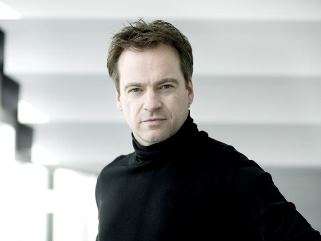|
Back
A Successful Attempt to Broaden Repertoire in China Shanghai
Symphony Hall
04/05/2019 - & March 27 (Geneva), April 9 (Tokyo), 2019
Claude Debussy: Jeux – Fantaisie pour piano et orchestre
Igor Stravinsky: Symphony in Three Movements
Paul Dukas: L’Apprenti sorcier
Jean-Frédéric Neuburger (piano)
Orchestre de la Suisse Romande, Jonathan Nott (conductor)

J. Nott (© Thomas Müller)
A French air was blowing through the SSO for this year’s Qingming Festival (translated as “Tomb Sweeping” Festival). Jonathan Nott and his Orchestre de la Suisse Romande, true to their vocation to promote francophone music, presented a daring program for Chinese concert halls (which was also presented in Geneva a week earlier), including lesser performed artists in China.
Although the compelling and dream-like Jeux and its constantly changing rhythm was the occasion of some intense fragments, usually led by the orchestra’s talented strings, it seemed that the balance could not be set well enough and the sound did not successfully fill the whole concert hall. The quieter parts of the ballet score appeared as a whisper which was lacking deepness and colour. By the end of the piece, we could not but feel left wanting.
While this issue of sound intensity could still be felt in Debussy’s Fantaisie, the performance of the French pianist, Jean-Frédéric Neuburger, was very warmly welcomed by the audience. His light and precise touch fitted perfectly Debussy’s impressionistic music – although this piece is often said to be not representative of the composer’s style. The very sensitive and passionate approach to this Fantaisie for piano and orchestra ended on a magnificent last outburst which perfectly concluded the first part of the concert.
After the intermission, Jonathan Nott made the rather daring choice to present Stravinsky’s Symphony in Three Movements to the Shanghainese audience, usually more inclined towards canonical classical and romantic works. The conductor gave himself fully to this modern symphony, dancing almost breathlessly all throughout the three movements. Straight from the opening of the first movement, the orchestra rendered a powerful “attack” – distinctive of Stravinsky’s compositions. The atmosphere was set, and so was the audience’s attention. But this was not just about musical power and war-like ambience, Jonathan Nott also managed to highlight the graceful side of the lighter Andante, led by woodwinds and the harp. The subtlety of the Symphony was also enriched by a darker colour created by percussions – mostly in the last movement –, without being overpowering thanks to a very well managed balance.
Finally, if Paul Dukas’s highly popular The Sorcerer’s Apprentice could probably not be but a success, the interpretation was yet again very cleverly and sensitively managed. The beginning was slightly decelerated, letting room for magical suspension and a sense of growing expectation. It was also a great way to emphasise the brief irruption of a faster woodwinds’ main theme.
Jonathan Nott chose not to end the concert on Dukas’s impressive coda, although it did trigger loud cheering from a very enthusiastic audience, and presented one last piece, thus prolonging the musical magic which was operating. After thanking the audience, he chose to share the fourth movement of Ligeti’s Concert Românesc. If the name of Ligeti was first welcomed by numerous “shui?” (i.e. ‘who’) among attendees, the orchestra and its conductor did not leave much room for further questions and made the audience embark on a last successful musical journey.
Nott’s gamble paid off. Yet another proof that pushing the boundaries of a repertoire can end in beautiful musical moments.
Gabrielle Farnier
|